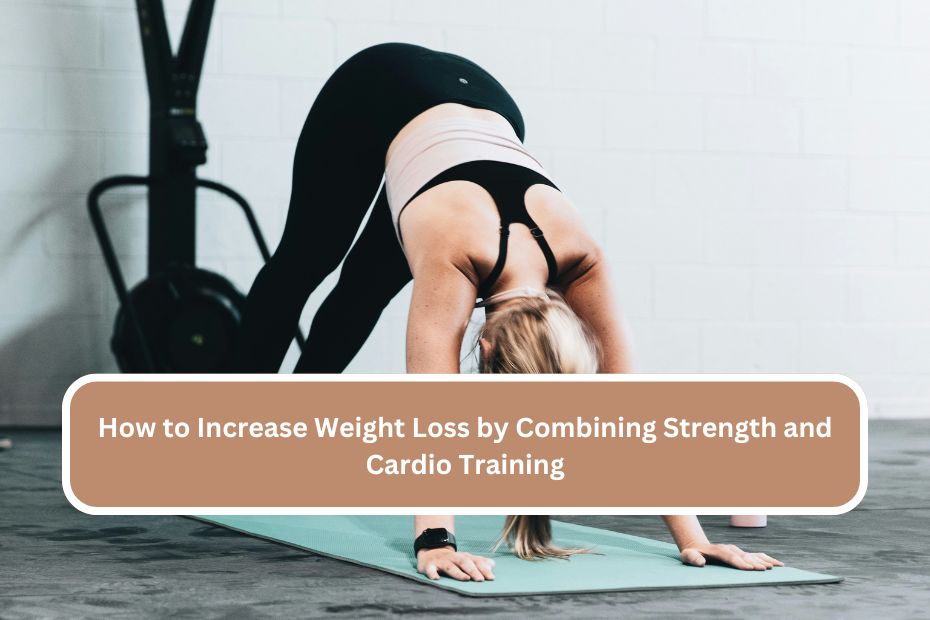Looking for an efficient way to boost weight loss? Combining strength training with cardio workouts can supercharge your fitness journey. These two types of exercise complement each other to burn fat, build muscle, and improve your overall health. In this article, we’ll explore how combining strength and cardio training can help you achieve your weight loss goals faster and more effectively.
Why Combine Strength and Cardio for Weight Loss?
Strength and cardio training target different aspects of fitness:
- Strength Training: Builds muscle, increases metabolism, and enhances fat burning even at rest.
- Cardio Training: Burns calories and improves heart health.
Together, they create a powerful synergy that accelerates weight loss while preserving lean muscle.
Benefits of Combining Strength and Cardio Training
1. Increased Calorie Burn
Cardio burns calories during exercise, while strength training boosts your metabolism for hours afterward through the afterburn effect (EPOC).
2. Preserves Lean Muscle
Strength training helps maintain muscle mass, which is crucial for long-term weight loss and a toned appearance.
3. Improved Fitness Levels
Cardio enhances stamina and cardiovascular health, while strength training improves power and physical endurance.
4. Balanced Workout Routine
Combining these workouts prevents overuse injuries and keeps your routine engaging.
How to Combine Strength and Cardio Training Effectively
1. Alternate Training Days
Focus on strength training one day and cardio the next. For example:
- Monday: Strength (weightlifting or resistance bands)
- Tuesday: Cardio (running, cycling, or swimming)
2. Incorporate Circuit Training
Combine strength exercises and cardio moves in one session for a high-intensity workout. For example:
- Squats (strength)
- Jumping jacks (cardio)
- Push-ups (strength)
- Burpees (cardio)
3. Opt for High-Intensity Interval Training (HIIT)
HIIT involves alternating between short bursts of intense cardio and strength exercises, maximizing calorie burn in a shorter time.
4. Use Compound Movements
Compound exercises like deadlifts, squats, and kettlebell swings engage multiple muscle groups and boost your heart rate, combining elements of both strength and cardio.
5. Add Active Rest Periods
Instead of resting between strength sets, perform low-intensity cardio like walking or light jogging to keep your heart rate elevated.
Sample Weekly Workout Plan
| Day | Activity | Focus |
|---|---|---|
| Monday | Weightlifting (Upper Body) | Strength Training |
| Tuesday | Cycling or Running | Cardio Training |
| Wednesday | Full-Body Circuit Training | Combined Strength/Cardio |
| Thursday | Rest or Light Yoga | Recovery |
| Friday | Weightlifting (Lower Body) | Strength Training |
| Saturday | HIIT (Sprints + Bodyweight Exercises) | Combined Strength/Cardio |
| Sunday | Long Walk or Swimming | Active Recovery |
Tips for Maximizing Results
1. Prioritize Nutrition
A balanced diet with lean proteins, whole grains, and healthy fats supports both strength and cardio training.
2. Stay Consistent
Stick to your routine and gradually increase intensity as your fitness improves.
3. Listen to Your Body
Avoid overtraining by incorporating rest days and paying attention to signs of fatigue or injury.
4. Monitor Progress
Track your weight loss, endurance, and strength gains to stay motivated.
Conclusion
Combining strength and cardio training is a powerful approach to weight loss. Strength training helps you build muscle and boost metabolism, while cardio burns calories and improves stamina. Together, they create a balanced routine that maximizes fat loss while preserving muscle mass. With consistency, proper nutrition, and an engaging workout plan, you can achieve your weight loss goals more effectively.

